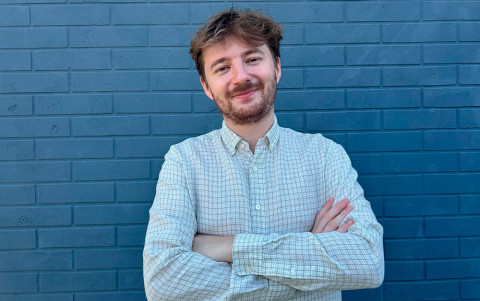Paul Gavriloaea is defending his thesis: "My research topic offer promising potential for 'greener' memory technologies in data centers"

The path of Paul Gavriloaea is coming to an end. A new start is coming. Next Tuesday, September 9, he will defend the work carried out during the last years along with Oksana Chubykalo-Fesenko (ICMM) and Rubén Otxoa de Zuazola (Hitachi Cambridge Laboratory). The title of his thesis is 'Light-magnetism coupling: towards the manipulation of magnetic domain walls and domains'. In his own words, "the thesis explores theoretically distinct mechanisms of light-magnetism coupling at the ultra-fast time-scale, with the aim of displacing, nucleating and overall manipulating magnetic textures in the shape of domain-walls and magnetic-domains."
What are the main applications of your research? Could you give us an example?
As digital infrastructure expands, data centers are playing an increasingly prominent role in global energy use.
Innovative, faster and more energy efficient data storage means are required across the whole digital spectrum, including cloud computing services, AI factories, digital banking or the autonomous driving industry. Laser-driven magnetic domain walls and domains offer promising potential for 'greener' memory technologies in data centers, enabling on-chip computation, reducing CPU–memory latency, and supporting the bandwidth demands of post-5G systems.
Why did you choose ICMM for your PhD?
I had already been involved with research in magnetism during my Bachelor's and Master's degrees. Studying at the University of York, I had the pleasure of meeting Oksana several times during a project I was working on at the time. Moreover I had been reading some of her scientific papers, ultra-fast magnetism came as a very interesting line of research for a PhD , so I hopped on.
What are the lessons you have learnt here? which one do you value the most?
Research is like driving an old steam-powered train — it keeps moving forward as long as you are shoveling coal into the firebox. Often however, it is worth pausing to appreciate the passing scenery along the journey.
How do you think this experience will contribute to your training and to your future?
I think more than anything it made me more resilient and flexible in the wind of changes that is life. Scientifically, I learnt a lot with Oksana and Rubén, as well as with the many other collaborators I worked with. Ultimately, it shaped my thinking which will inevitably play a role irrespective of my future.
What are your plans once you finish your PhD?
Currently, I am exploring other research topics beyond the PhD as well as more practical approaches to science other than what academia has to offer.
Why did you become a scientist? Who have been your role models?
In many ways it has been a pragmatic decision at first - I haven't been specifically curious about Physics as a youngster, but I always liked puzzles, brain-teasers and tackled philosophical questions. Later, I sort of realized Physics is a good mixture of this all, plus the abstract mathematical rigor. My role models are embodied by many of the people I met during my studies, there's a curious and liberating feeling to discuss Physics in the company of passionate and experienced scientists, I sort of strove to emulate this - to wonder it's a form of joy.
Instituto de Ciencia de Materiales de Madrid (ICMM)
Sor Juana Ines de la Cruz, 3
Cantoblanco, 28049
Madrid, España
Telephone: (+34) 91 334 90 00
Email: @email
Communication Office: @email

Acknowledge the Severo Ochoa Centres of Excellence program through Grant CEX2024-001445-S/ financiado por MICIU/AEI / 10.13039/501100011033

Contacto | Accesibilidad | Aviso legal | Política de Cookies | Protección de datos